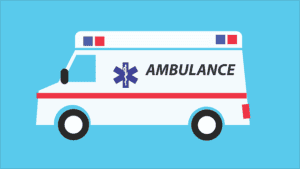
Do you know what to say in English in case of an emergency? In the moment, you might panic and not be able to think of the English words that you need – so it’s good to learn and practice them beforehand. Today I’ll be teaching you how to talk about various medical emergencies, accidents, and other dangers.
If someone has cut themselves, they will be bleeding (that’s the verb). Blood will be coming out of the person’s body. You need to apply pressure to stop the bleeding. After some time the blood will clot (harden). At the hospital, the doctor will give the person stitches (close the cut with a thread or sutures) and if the person has lost a lot of blood, they might need a blood transfusion (transfer of donated blood into their body).
When a person gets a piece of food caught in their throat and can’t breathe, you can say “He’s/She’s choking!” The procedure to force an obstacle out of a person’s airway is called the Heimlich maneuver.
When someone loses consciousness, you can say “He/she fainted” or “He/she passed out.” If the person lost consciousness due to an impact to the head, you can say “He/she was knocked out.” Before a person faints, they might say “I feel dizzy” (like the world is spinning) or “I feel light-headed.”

If someone appears to be in pain, you can ask him or her “Are you feeling all right?” or “Where does it hurt?” to get more specific details. If someone appears to have a head, neck, or back injury, you should tell them “Don’t try to move.” You can also say things to calm and comfort the person, like “Help is on the way” or “It’ll be OK. I’ll stay right here with you.”
If necessary, you can ask someone to call 911 or call an ambulance in order to get emergency medical help. You can also say “Where’s the nearest hospital?” if you plan to take the person there yourself.

Another serious situation is having a heart attack, when blood stops flowing to part of the heart and damages it. Someone who is having a heart attack might say “My chest hurts.” Another possible problem is if someone says “My heart is racing” – this means it is beating much faster than normal.
If someone is having problems speaking and can’t move or feel one side of their body, you can say “I think he/she is having a stroke” – that’s when poor blood flow damages the brain.
When someone’s heart stops, you can say “He/she has no pulse” (meaning their heart isn’t beating, so blood isn’t flowing). This situation needs immediate action, so you can say “Does anyone know CPR?” – CPR stands for cardiopulmonary resuscitation. You press repeatedly on the person’s chest to manually keep the blood flowing until the person’s heart can be shocked back into normal rhythm using a machine called a defibrillator.

When someone is struggling to swim and might be in danger, you can say “He/she’s drowning!” You should immediately call the lifeguard, if one is available.
When a pregnant woman is about to have her baby, she might say “My water broke” meaning the membrane holding the fluid around the baby has broken. This means she is about to go into labor (start the process of the baby coming out). She might also be having contractions (feeling painful tension in her uterus).
Here are some phrases to use if someone is a victim of a violent attack:
- He was shot (with a gun).
- He was stabbed (with a knife).
- He was hit by a car.
- He was beaten up. (physically attacked with punches and kicks)
- He was bitten by a dog/snake.
If you are in a building and you think there might be a fire, you can ask others, “Do you smell something burning?” or say “I smell smoke.” If the building is on fire, the smoke detector should notice and the fire alarm will alert everyone. Hopefully everybody leaves and no one gets trapped in the building (unable to leave because of the fire). The smoke is actually a bigger danger to health than the flames (the orange part of the fire).

Another serious situation is if there’s a gas leak. If you smell gas, you might tell people, “Everybody out! There’s a gas leak, we need to evacuate the building.”
After a storm or strong winds, live power lines (meaning electricity is running through them) might get knocked down. You can warn people by saying “There’s a power line down over there – don’t go near it” or “Stay away from the downed power line.” You should call the electrical company so they can turn off the power and repair the line.
I hope you feel better equipped to use your English in case of emergency!










